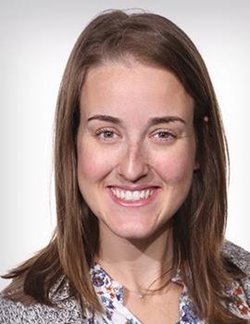 Knowing your breast cancer risk can help you taking appropriate and early action to reduce your chances of a confirmed diagnosis. Carle designed its new multispecialty High-Risk Breast Clinic for patients with an increased risk of breast cancer due to familial or breast biopsy based risk factors.
Knowing your breast cancer risk can help you taking appropriate and early action to reduce your chances of a confirmed diagnosis. Carle designed its new multispecialty High-Risk Breast Clinic for patients with an increased risk of breast cancer due to familial or breast biopsy based risk factors.
Experts in breast health, screening, imaging, genetics, oncology and surgery make the team and a referral from your primary care provider can get you started.
“We help patients develop a personalized risk management plan,” Maria Grosse Perdekamp, MD, Oncology, said. “That plan for a high-risk breast cancer patient might include more intense screening, genetic testing, breast exams by a healthcare provider, lifestyle changes coaching or preventive risk reduction surgeries.”
Depending on an individual’s circumstances and family history, the team might offer patients medications to lowering their breast cancer risk.
“We provide options and education, but ultimately the patient decides alongside us what option is best for them,” Dr. Perdekamp said.
Carle’s world-class multidisciplinary expertise and access to the latest technologies makes it an ideal place to host the regional service – the first and only in central Illinois.
“Not only do we provide high-resolution breast screening, 3D mammograms (tomosynthesis) and breast MRI, but our team’s commitment to patient-center care is second to none,” Jason Hirschi, Carle Cancer Center director, said.
As a long-time National Cancer Institute site, Carle patients benefit from access more than 100 pioneering clinical trials bring cutting-edge treatment to the community.
Those who qualify include:
- Family history of breast or ovarian cancer.
- Patients with known genetic mutations for high-risk breast cancer.
- Tissue-based (breast biopsy) findings. These include atypical ductal hyperplasia, atypical lobular hyperplasia and lobular carcinoma in situ.
 A nurse practitioner will expertly advise patients with high risk for breast cancer and help them navigate preventative steps.
A nurse practitioner will expertly advise patients with high risk for breast cancer and help them navigate preventative steps.
“For those patients who currently do not have cancer, but are at a higher risk for developing it, I’m their link,” Hannah Dignan, APP, High-Risk Breast Clinic said. “I’m dedicated to keep my eyes on them and ensure they’re getting the extra screening or interventions they need."
Together, provider and patient will focus on prevention and early interventions to reduce needing treatments that are more aggressive in the future.
“There are a number of things we go do today to lower or even eliminate your risk for ever having cancer in the first place,” Dignan said. “I’m able to take extra time to learn about the individual, their family, their risk and their overall health goals. By connecting earlier, we’re able to make a real impact on their life and potentially their family too.”
Educating a patient about their risk and determining whether that extends to their family members is part of the package.
“The care they receive through us can also help guide their children, grandchildren or other family members who may also be potentially at risk and can benefit from knowing more earlier,” she said.
Speak to your primary care provider about your family history of breast and others cancers routinely and reach out to the High-Risk Breast clinic for more information at (217) 383-3010 or learn more online at carle.org/cancer.
Categories: Culture of Quality
Tags: BRCA, Breast cancer, Cancer, Champaign-Urbana, mammography, Mills Breast Cancer Institute, women’s health
